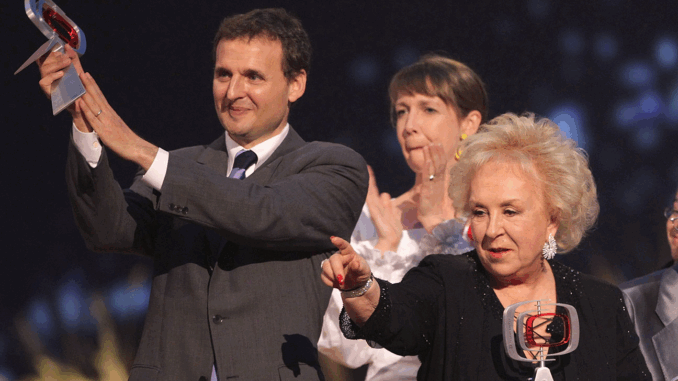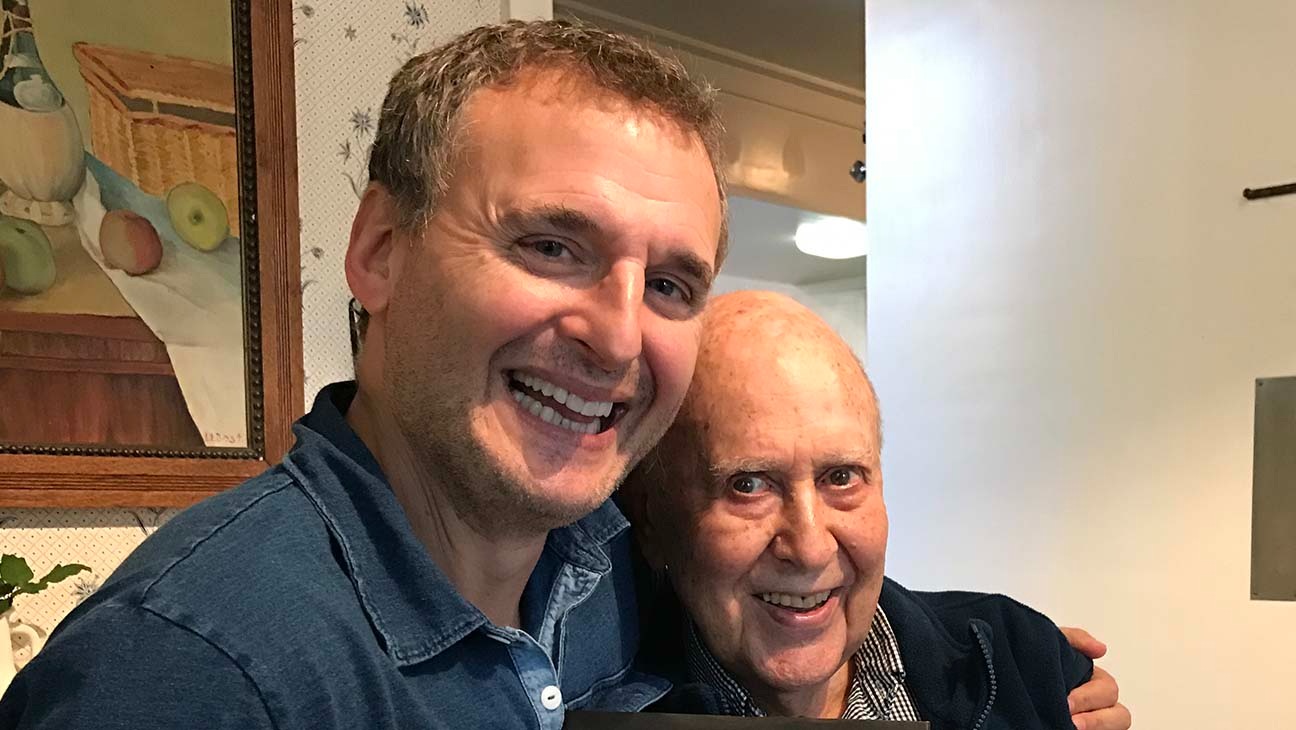
The Simple Truth Behind a Plate of Food
What if the solution to division, anger, and disconnection wasn’t politics or technology — but dinner?
That’s the heartfelt belief of Phil Rosenthal, the creator of Everybody Loves Raymond and host of Somebody Feed Phil.
Rosenthal has traveled the world tasting everything from street tacos in Mexico to pasta in Italy, and through it all, one message keeps resurfacing: food is humanity’s greatest connector.
In a time when people seem more divided than ever, Rosenthal reminds us of something simple — a shared meal can remind us what it means to be human.
The Heart Behind Phil Rosenthal’s Mission
Rosenthal isn’t just a TV producer or food traveler — he’s a storyteller on a mission.
After creating one of the most beloved sitcoms in American history, he shifted his focus from family dinners on screen to real dinners around the world.
In Somebody Feed Phil, you can see it in every smile and every laugh — the universal language of food.
He doesn’t just eat; he connects. He listens. He learns.
And in a recent interview, he said it best:
“We need to get back to humanity. Food brings us together in ways nothing else can.”
Food as a Universal Language
Think about it — no matter where you come from, everyone understands food.
It’s love on a plate, tradition in a recipe, and connection in a single bite.
Rosenthal believes that food transcends culture, religion, and politics. When people sit down to eat, they share not just a meal but a moment — a pause in the chaos where empathy can grow.
Whether it’s dumplings in China, pizza in New York, or curry in India, every dish tells a story of people, place, and passion.
From Sitcoms to Suppers: The Evolution of Phil’s Storytelling
Rosenthal’s journey from Everybody Loves Raymond to Somebody Feed Phil might seem like a big leap, but in truth, it’s a natural extension.
Both shows center around the same theme — connection through shared experiences.
Raymond connected people through laughter and family life, while Feed Phil connects them through food and culture.
His storytelling evolved, but the heart behind it stayed the same: find what brings people together — and celebrate it.

Why Food Matters More Than Ever
In an age of social media arguments and cultural divides, Rosenthal’s message feels especially relevant.
Food forces us to slow down. To talk. To listen.
When you sit at a table with someone, you’re not scrolling or shouting — you’re sharing. You’re reminded that behind every difference is a person with the same basic needs and desires.
That’s the kind of humanity Rosenthal wants us to return to — one meal at a time.
The Emotional Power of a Shared Meal
Have you ever noticed how many of your favorite memories involve food?
It’s not the dish itself — it’s who you were with.
Rosenthal often says that people don’t just remember what they ate, but how they felt while eating it. That emotional imprint is why food can unite us when words can’t.
When we eat together, we stop being strangers.
The ‘Somebody Feed Phil’ Effect: Joy Across Borders
Through Somebody Feed Phil, millions have witnessed how one man’s curiosity and kindness can bridge worlds.
Rosenthal doesn’t approach new cultures as a critic but as a guest. He celebrates, not compares.
His laughter, his wide-eyed wonder, his genuine reactions — they remind us that joy is contagious.
The show’s success proves that people are hungry not just for food, but for connection, laughter, and humanity.
Food as a Catalyst for Empathy
Every meal shared with someone from a different background opens a window to understanding.
Rosenthal shows us that you don’t have to agree with someone to share a meal. In fact, sharing food is often the first step to bridging divides.
It’s hard to hate someone when you’ve broken bread together.
Food softens the edges of conversation — it reminds us we’re all made of the same hunger, literally and figuratively.
Cooking as an Act of Love
Rosenthal often says that cooking for someone is the purest expression of love.
When you prepare a meal, you’re giving time, effort, and care — the ingredients of genuine connection.
From his parents’ old family recipes to meals with locals abroad, Rosenthal treats every dish like a story passed down through generations.
And isn’t that what love really is? Something shared, something remembered, something that nourishes?
Why Phil’s Message Resonates Worldwide
Phil Rosenthal’s authenticity is what makes his message so powerful. He’s not lecturing — he’s living it.
He’s out there tasting, laughing, and hugging his way through cultures most of us only dream of visiting.
His message lands because it’s universal. Everyone eats. Everyone laughs. Everyone belongs somewhere at a table.
“We Need to Get Back to Humanity”: What It Really Means
When Rosenthal says we need to “get back to humanity,” he’s not just talking about kindness — he’s talking about reconnection.
We’ve traded real conversation for comment sections, shared meals for solo screens, and empathy for ego.
Food is one of the few things that can still cut through all that noise.
A bowl of soup. A loaf of bread. A cup of coffee. Small things, maybe — but small things that remind us of our shared humanity.
The Role of Food in Healing Communities
From community kitchens to food festivals, shared meals have long been the foundation of togetherness.
Rosenthal champions the idea that eating together can heal divisions — because it forces people to see each other as human again.
In cities divided by class, race, or ideology, communal dining has the power to start conversations where none existed before.
Lessons from ‘Everybody Loves Raymond’ That Still Apply
Even back in Everybody Loves Raymond, Rosenthal understood that families bond and bicker around the dinner table.
It wasn’t just a sitcom prop — it was the show’s emotional core.
The humor, the love, the misunderstandings — they all unfolded over meals.
That’s because food, just like laughter, is something everyone relates to.
A Call to Action: Bring Back the Dinner Table
So how do we “get back to humanity,” as Phil says?
We start small. We put down our phones. We invite someone over. We eat together.
Rosenthal believes that world peace might just begin with dinner.
It sounds idealistic — until you realize how much good can happen when people simply sit and share.
Dinner isn’t just dinner. It’s dialogue. It’s connection. It’s the start of something better.
Conclusion: Humanity Is Served
Phil Rosenthal’s message isn’t about food — it’s about people.
Every bite shared is a reminder that behind our differences, we’re all the same kind of hungry — for warmth, understanding, and connection.
As the creator of Everybody Loves Raymond and the face of Somebody Feed Phil, Rosenthal continues to serve something far richer than meals — he serves hope.
Because in the end, when we come together around food, we don’t just feed our bodies — we feed our humanity.
FAQs
1. What does Phil Rosenthal mean by “get back to humanity”?
He means returning to empathy, kindness, and genuine human connection — often through shared meals.
2. How does ‘Somebody Feed Phil’ promote cultural understanding?
By showcasing food traditions worldwide, Rosenthal bridges cultural gaps with humor, curiosity, and respect.
3. Why is food such a powerful connector?
Because it’s universal — everyone eats, and shared meals create moments of bonding beyond words.
4. How can I apply Rosenthal’s message in daily life?
Cook for loved ones, share meals with neighbors, and use food as a bridge to conversation and kindness.
5. What’s Phil Rosenthal’s biggest takeaway from traveling the world?
That people everywhere are more alike than different — and that food is the most delicious proof of that truth.
